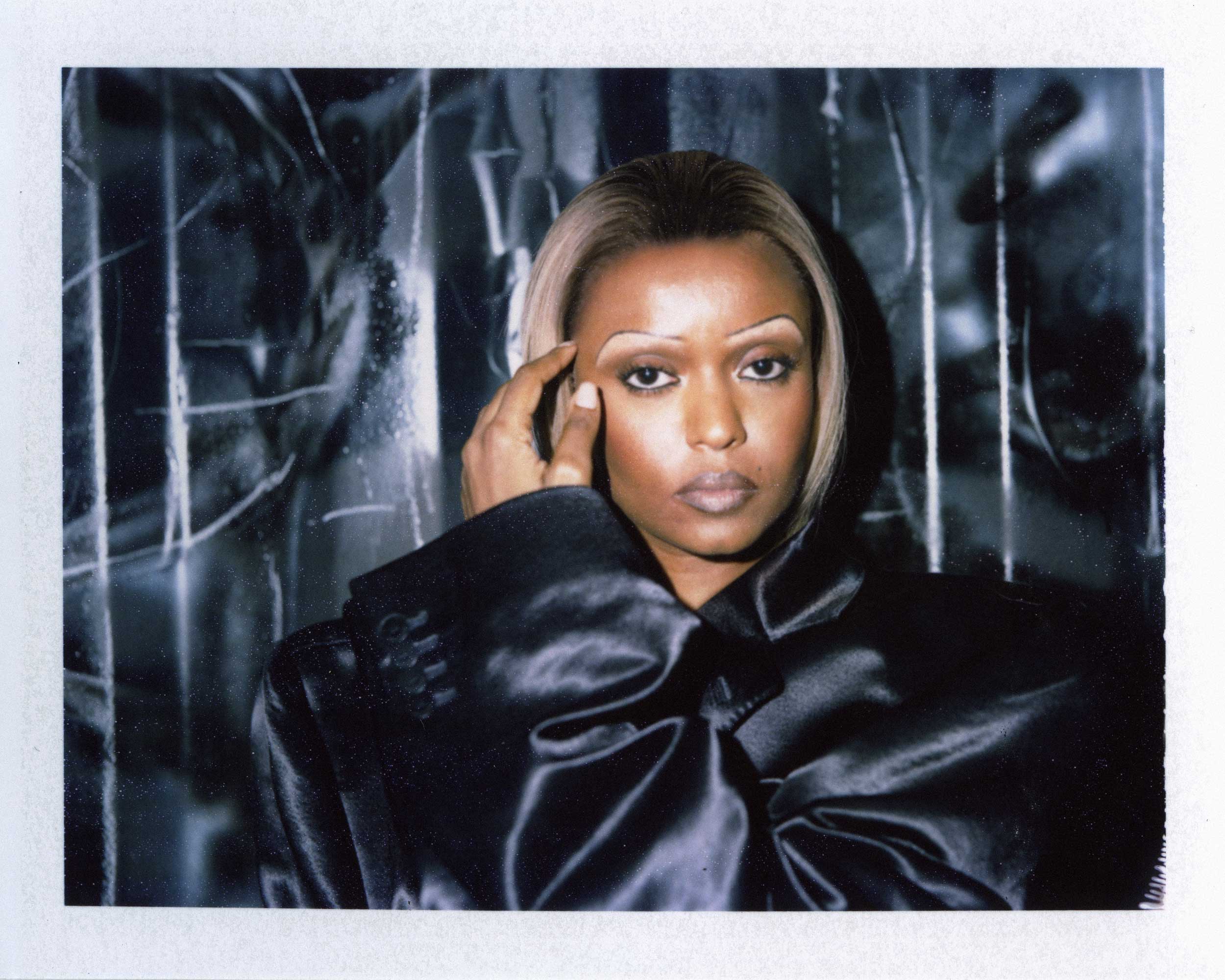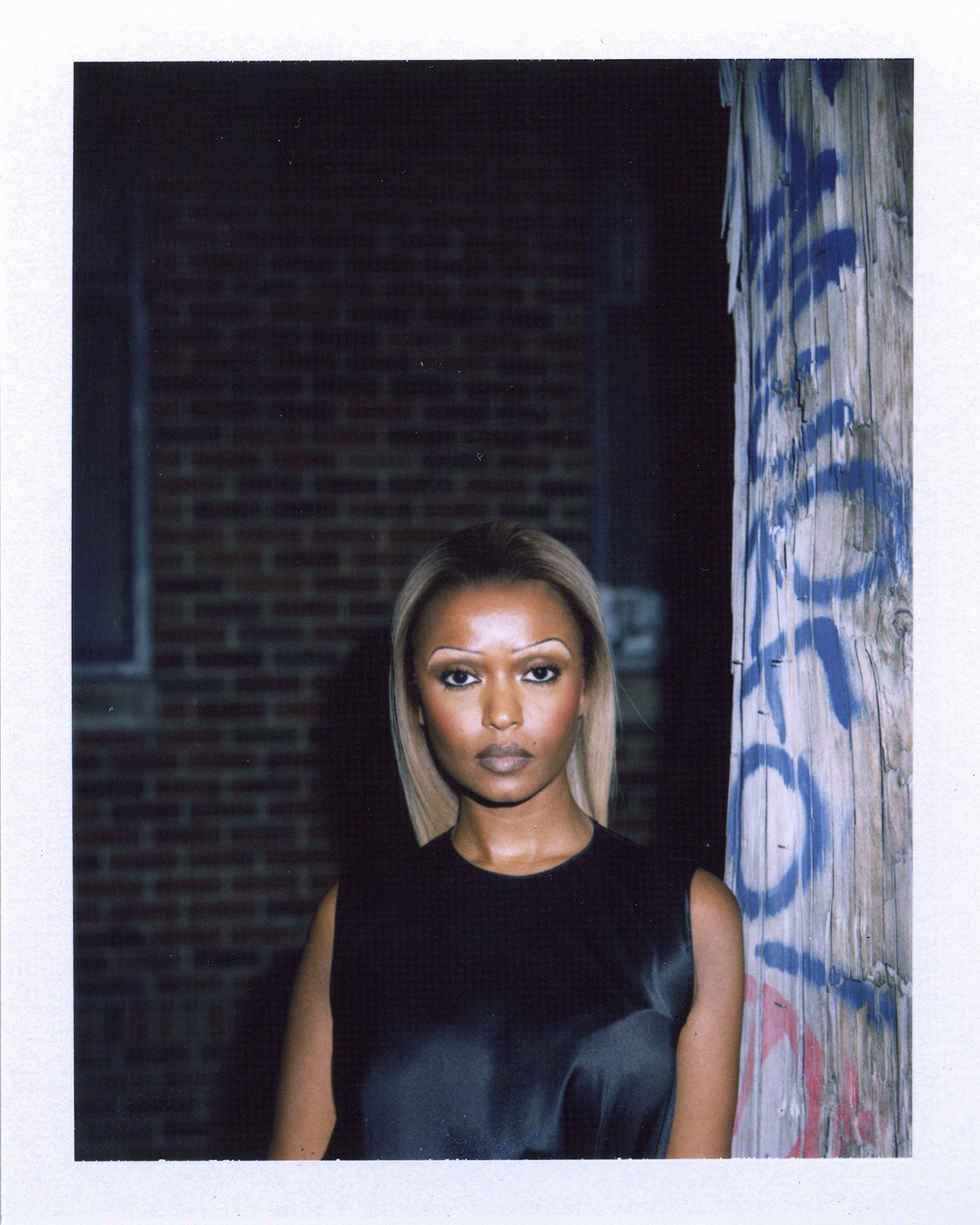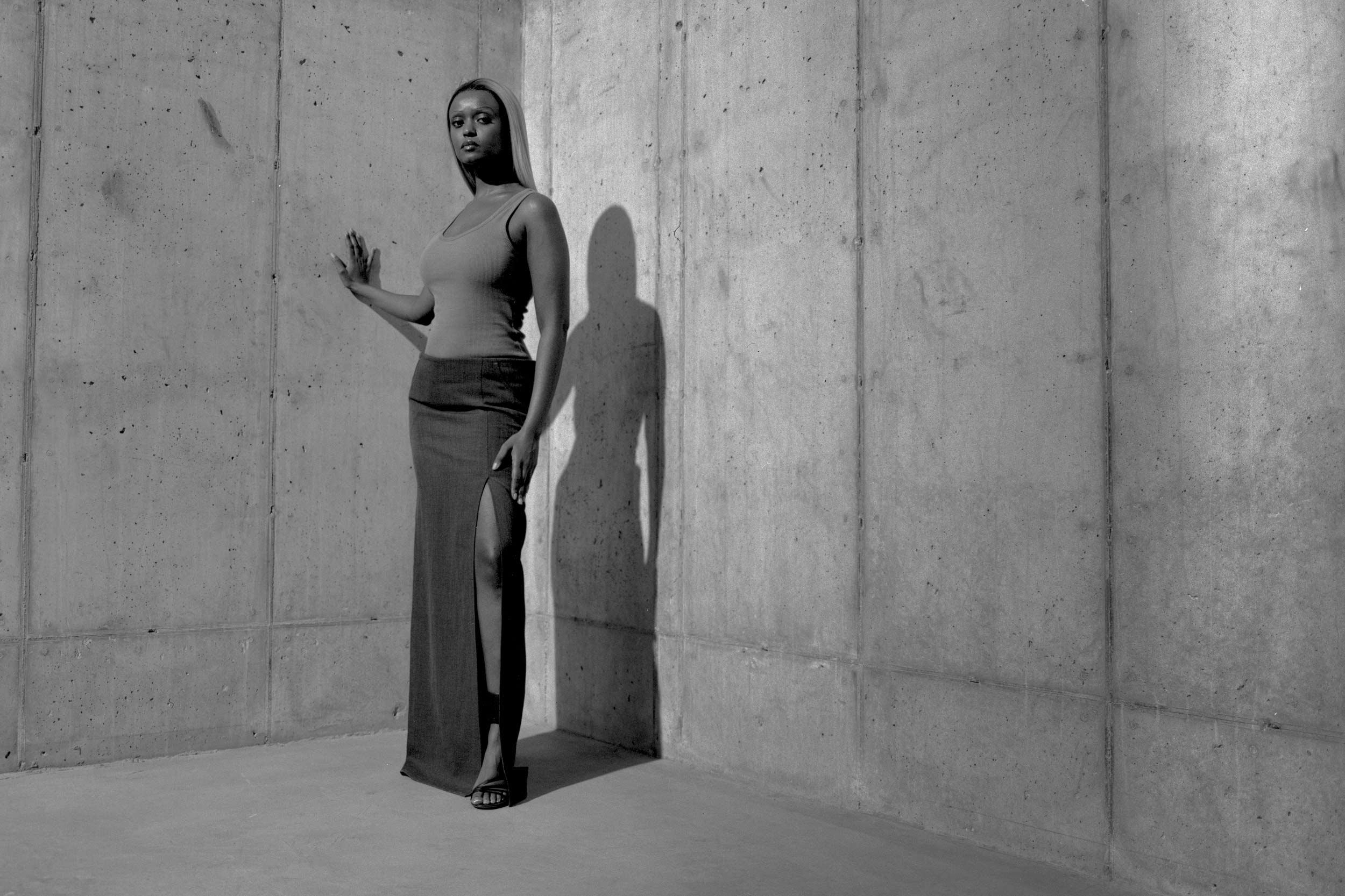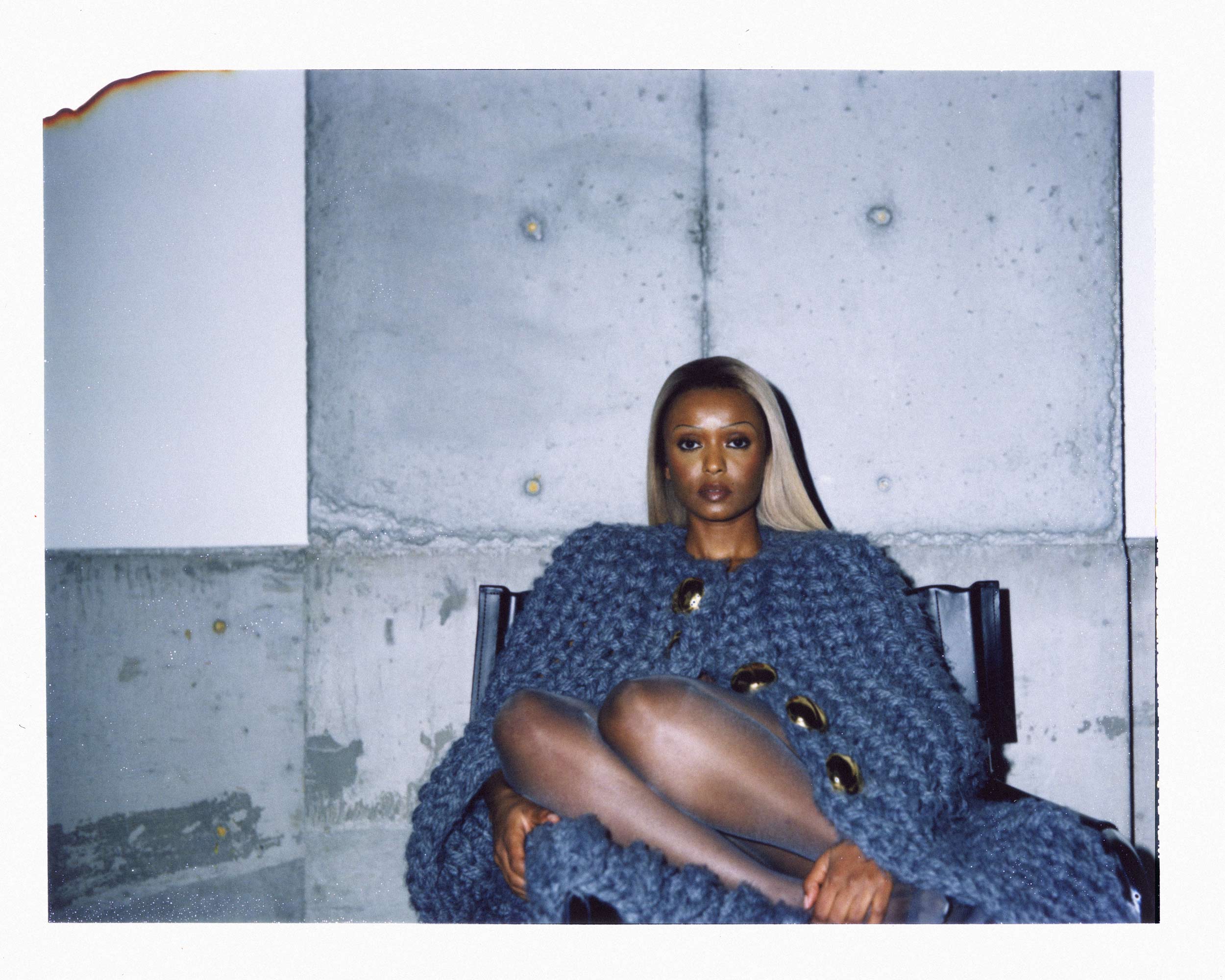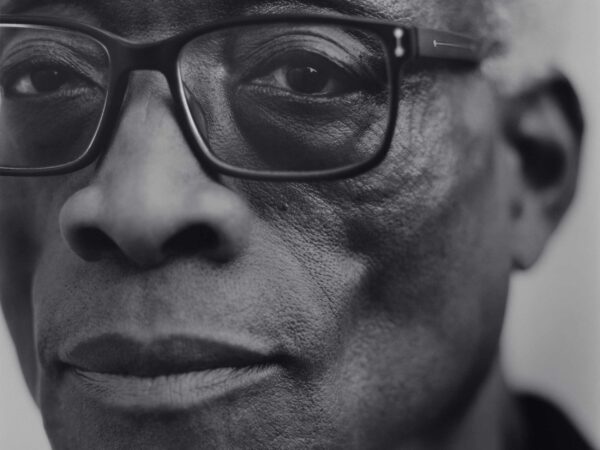Inside the artist’s main characters for Document’s Spring/Summer 2024 issue—those who pre-game in Santee Alley, dance behind the DJ booth, and taking up space
Kelela is an artist who at first glance and listen seems other-worldly. Yet, she is also firmly grounded in the world she shares with the rest of us, squarely facing the rigor it takes to transcend its man-made limits on love. She is nodal. Much of her work seeks to lift the body into a current of healing release. Her vocals carry away and drift like the sound of the ocean which punctuates the end of her single “Enough For Love.” In this track from her 2023 album Raven, she asks, “Tell me, are you keeping up with your wounds? / Can you love me through it, baby?”
Like her lover, we can only lean back and trust where she is taking us. She is not alone in this call. Community is central for Kelela—as shown not only by her rich collaboration with her touring musicians and other artists throughout her career, but also in her recent return to her dance floor roots in RAVE:N, The Remixes. The 20-track album features edits from DJs, performers, and producers across the Kelela extended universe, like Shygirl, TYGAPAW, LSDXOXO, Leech, and Bbymutha.
Simply put, Kelela is a siren pulling us into an empowering story of beautiful yet fleeting moments “stolen” in a time where women like us are never supposed to know them.
For Document, I talk with the singer about tenderness on the stage, vulnerable collaboration, dancing in the DJ booth, and the exposition of self in a world that is hostile to your flesh.
Shaadi Devereaux: I have a beautifully contentious relationship with music because I’m a dancer and dancing is about the body. As a trans woman who is also Black, there are not many public open spaces where I feel my body is allowed to move freely, even if it’s just having to look over my shoulder at a club. Even queer spaces have their own limits and restrictions. Where do you go dancing and where do you feel safe? Where do you find yourself breaking free when dance floor politics seek to restrict rather than expand you?
Kelela: I’m always hovering around the booth. Maybe it’s because I’m friends with DJs. That’s how I’m experiencing the club. Even before, all my party experience was music related, as a performer. I would be walking in as a musician, thinking I’m going to sing, or just being friends with the DJ and listening to sets very intently. It starts there.
The look is [also] a big part of the experience. Lately, I’m always running behind so it’s not giving vibey- soundtrack-getting-ready vibes. But I do love a pregame, like, getting ready mix. I have a few on my phone. Just experimentation. That’s a big part of what I want to do when I go out, is experiment with a look on some level. It doesn’t have to be that crazy.
I used to go shopping in Santee Alley in LA almost every Monday night. My friends threw a party called Mustache Mondays. We would go buy some cheap clothes, and it was really fun to put the look together because it felt like therewere no expectations at the party. It wasn’t only about a high fashion moment. It wasn’t about a particular look. It felt really queer in that way. It felt so wide, the options. That’s the place the show looks or the video will come from. It’s based on a very real aspirational everyday moment.
At the DJ booth, I feel like I’m going to a show. I’m paying close attention to what this person is doing and I’m feeling inspired as if I’m watching somebody perform. That’s a big part of the catharsis for me.
And the safety factor is related to the DJ booth part. For me, that’s always been the safest place to dance the way I really want to dance. Unfortunately, it’s not on the dance floor.
Shaadi: You’re making so much sense. I’m a booth girl too. Booth girls unite.
Kelela: [Laughs] I’ve never really named this ever in my life, but I’m just going to state that. I stay around the DJ booth because it’s the safest place. I can’t be nasty in the middle of the dance floor. I also love a behind-the-booth makeout.
When I’m making songs, I do think about my experience on the dance floor and how it feels. But I’m coming in as a music nerd. I’m dancing, but I’m listening to music. I can lose myself, but it’s gotta be induced. Even at Berghain, I’m going because one of my friends is DJing. I’m dancing, but I’m dancing towards them. I’m dancing to communicate with them. I’m having really memorable connected moments with my friends.
“I’m looking for a tenderness. A ‘comfort-with.’”
Shaadi: There was a moment of sonic healing for me watching your most recent Tiny Desk performance in February. For me, it looked like a celestial symphony that was dropped down from a star system into a tiny room on Earth.
Kelela: I’m screaming.
Shaadi: Normally in the media you have queer women, queer Black women, trans women presented in a very specific way, often in defense of their bodies. Here they were just able to create this sound. You have this huge harp taking up all this space within the room. It’s beautiful. You have these women with these otherworldly voices and sounds. Yourself and your own otherworldly voice. For me this moment felt like watching divine regeneration. That was a big moment—to see queer Black women in motion instead of defense. Able to go further than the limits of other people’s imaginations but also able to create lucrative livelihoods for themselves. To create music. Are these collaborations and pairings intentional for you?
Kelela: Everything is intentional. What I love is that if you see my friends who might not be musicians, who are artists in other disciplines, there’s a rigor to how they’re thinking about themselves—their place in the world and their own healing. I’m looking for a tenderness. A ‘comfort-with.’ I’m looking for bandmates and creative partners in general who are in touch with that part of themselves and are leading with vulnerability in many aspects of their lives and with whom that ethic would resonate. As many spots that my personal economy creates, I’m wanting to fill it with those people. I do prioritize Black people. I do prioritize queer Black femmes, to be really honest, over everybody. That’s why you are doing this interview. That’s why Ahya [Simone] is on harp. That’s why Alayna [Rodgers] and Sis [are on vocals]. That’s a big part of what I’m doing and I want it to serve us, because there are so few contexts that do.
I cried a little bit when I first saw the Tiny Desk because there’s so much emotionality that is coming out of Ahya. There’s this one part where the camera zooms in on her and she’s just so inside the harp and she looks so emotional as she’s swaying. I don’t know, it just makes me want to cry, even now. There’s this other moment where Alayna does this thing with her hands where she’s got her arms out, her elbows are out in front of her, and her fingers are spread a little bit. And she keeps making this sort of waving motion with her hands, closing her eyes, and just looking like she loves this so much. The emotions just oozing and spilling out.
Shaadi: This is a love story. I’m hearing tenderness, a love story, a very Venusian experience.
Kelela: I’m not familiar. I don’t know any mythology, literally zero. But that’s a huge part of how I choose who I want to spend endless time with, especially in confined spaces. The way we have to be on tour, it matters so much to have a team. With Briley on keys and Buz on drums, I chose both of them because there’s tenderness in their approach as well. It really helps me say what it is I’m trying to say. It’s a huge part of how I’m thinking about community.
“I want to create a movie soundtrack for your life that makes you feel like the main character. That’s the test it has to pass.”
Over the pandemic, I became more clear about the culture I created in my world. That culture is definitely one of wearing your heart on your sleeve, leading with vulnerability and tenderness. Maybe experiencing a lot of different forms of rejection, but being clear that it’s not you and centering love still. Being among the people who experience the least amount of love collectively, from the world, and being the best lovers. That’s the tribe that I created.
I remember ‘Washed Away.’ When I first started it, I was like, ‘This is the beginning of the record and it’s saving me.’ It almost felt like I got lifted out of a terrible situation. I’m far away from the danger, but I’m also isolated. I’m safe, but I’m isolated. That sort of duality… I felt like if it does this to me, it’ll do this to the girls. And the girls was like, ‘Bitch, it did do that.’ [Both laugh]
I played it for so many of my friends and it was tears on the first song. I think that has to do with them empathizing with me as a person in part, but more so them feeling centered in the story themselves. Crying for themselves. I think that’s the world I’m trying to create within this world.
Shaadi: I think growing up in the ’80s, ’90s, or early 2000s, it was a very difficult time if you were Black, a different kind of body, if you were in any way different from… the word we will use is ‘hegemony.’ What is considered to be associated with power. For me, coming of age, it felt like I was holding my breath my whole childhood and teenage years and there was this collective sigh when there was even the tiniest bit of space. Are you writing for us, for people who were in that darkness, for yourself?
Kelela: I am thinking about you when I am writing. I am thinking about niggas who gotta go to work and fucking hate it. I’m thinking about the car ride I would have to make when I just don’t want to do this and, yeah, the darkness. I’m thinking of the darkest of the darkest. The darkest of our routines that we’ve had to do. The push through. Does this work for the push through? Does this help you push through? I’ll change lyrics if it doesn’t feel productive. I’ll be like, ‘I can’t have Black women screaming that lyric over and over again in their car.’ That girl who has to stomp when she’s on the train. I’m like, ‘No, let’s say this lyric.’ It’s a very big deal. I want to create a movie soundtrack for your life that makes you feel like the main character. That’s the test it has to pass. Does the wind feel like it’s blowing enough for you in your hair, so we can get the shot of your despair? Because if we’re about to be sad and struggling, at least let it be to an incredible soundtrack.
Hair Matt Benn at CLM. Make Up Raisa Flowers at EDMA. Manicure Sonya Mesh at Forward Artists. Photo Assistant Olivai Rae Harris. Photo Intern Jewel Champbell. Stylist Assistant Ore. Production Lisa Olsson Hjerpe at CHAPEL Productions. Production Assistant James Scalise.





